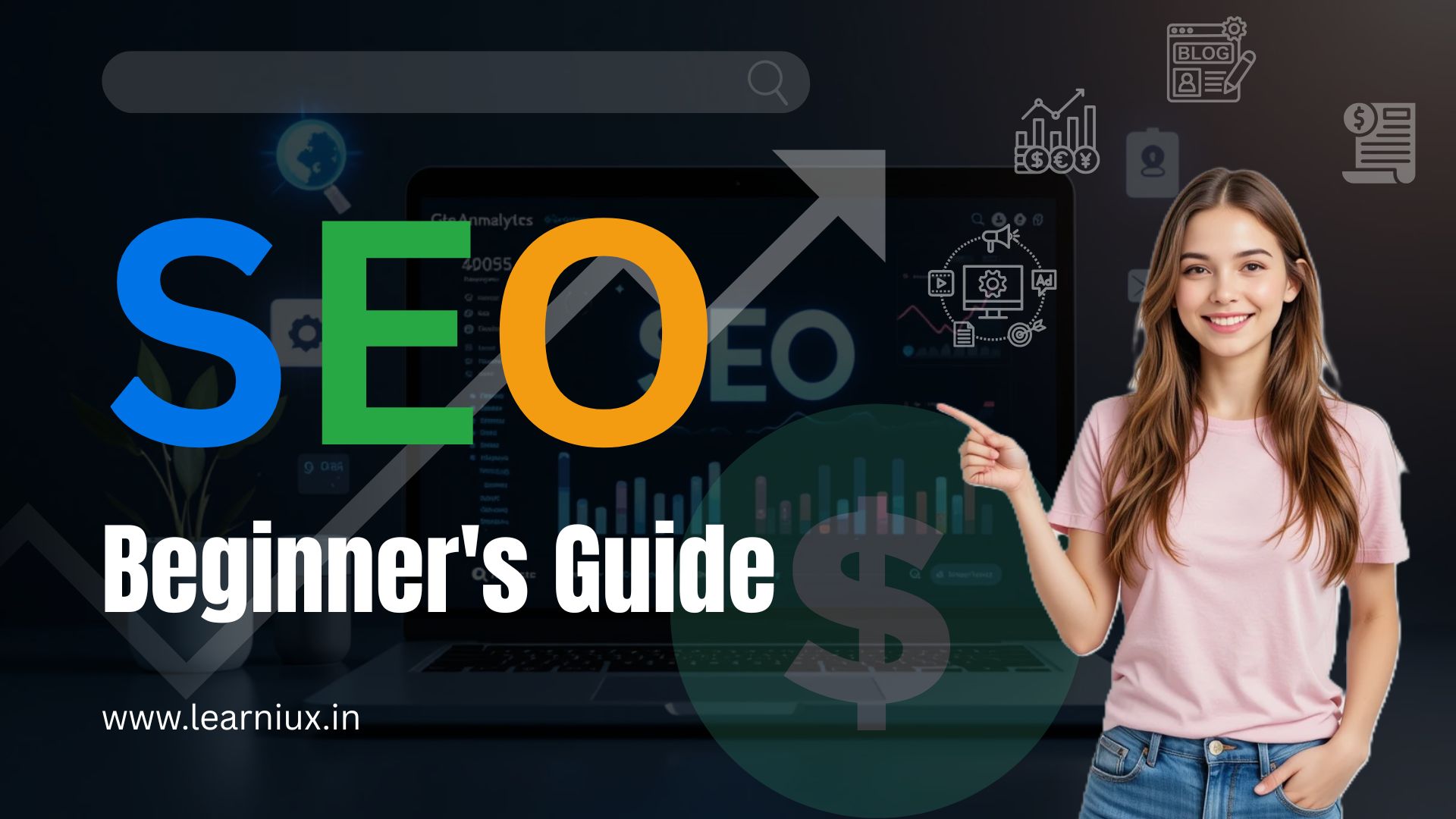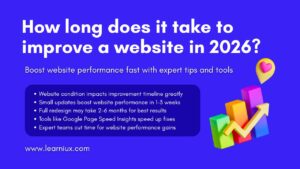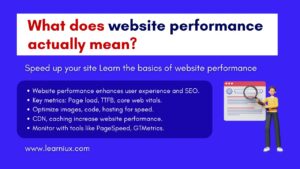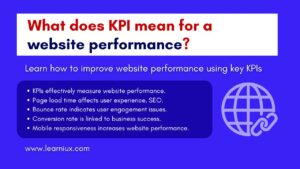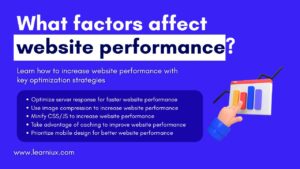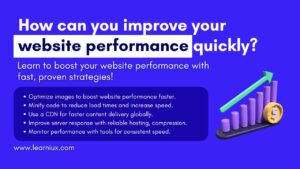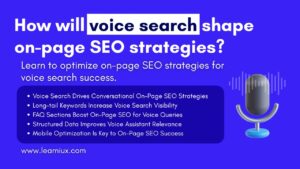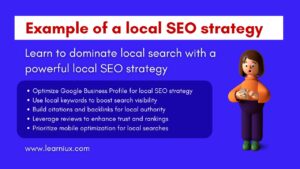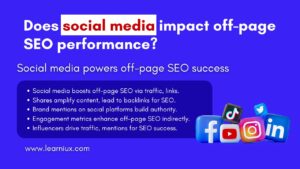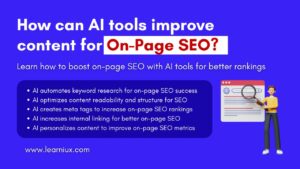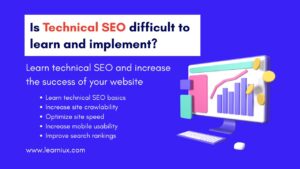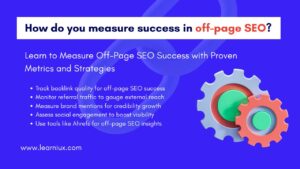Introduction to Search Engine Optimization
Search engine optimization, also known as SEO, is the process of optimizing your online content so that search engines like Google rank it higher in relevant search results. If you want to drive organic traffic to your website, SEO is your most effective long-term strategy. This guide is specifically designed for beginners who want to get started with SEO and build a strong foundation.
Why SEO is important for every website
SEO is important because it helps your content appear on the first page of search results. More visibility equals more traffic, which can lead to more engagement, leads, or revenue. Whether you run a blog, business site, or portfolio, SEO gives your online presence the discoverability it needs. Without SEO, even the best content can remain invisible.
How search engines understand your content
Search engines like Google use bots to crawl web pages. These bots index your site’s content and rank it based on a number of factors, such as relevance, content quality, keywords, user experience, and backlinks. Understanding how Google’s algorithms work gives you a strategic advantage in optimizing your content.
Keyword Research for Beginners
Keywords are the words that users type into search engines. Effective SEO starts with identifying the right keywords to target. Use tools like Google Keyword Planner, Ubersuggest, or Ahrefs to find keywords with good search volume and low competition. Focus on long-tail keywords that are more specific and easier to rank for.
On-Page Optimization Made Easy
On-page SEO involves optimizing individual pages to rank well. Key elements include:
- Title tag with primary keywords
- Attractive meta description
- Proper title structure (H1, H2, H3)
- Internal linking to related content
- Alt text for images
- Clean URL structure
- Fast loading times
Content should be high-quality, original, and formatted for readability. Use your keywords naturally without stuffing.
Off-page SEO strategies
Off-page SEO revolves around building authority and trust. The most effective strategy is backlink building. When high-authority websites link to your content, Google considers it a vote of trust. Guest posting, content sharing, social bookmarking, and digital PR are all major ways to get quality backlinks.
Technical SEO Basics
Technical SEO ensures that search engines can crawl and index your site efficiently. Essentials include:
- Fast-loading site (use tools like PageSpeed Insights)
- Mobile responsiveness
- Secure HTTPS connection
- Properly structured sitemaps
- Clean robots.txt file
- Fixing broken links and crawl errors
Google’s core web vitals also play a key role in technical SEO performance.
Common SEO mistakes to avoid
Many beginners make mistakes such as:
- Keyword stuffing
- Ignoring mobile optimization
- Not using analytics tools
- Publishing thin or duplicate content
- Poor internal linking
- Ignoring meta descriptions
- Avoiding these can significantly improve your rankings.
Free SEO Tools You Should Use
Here are some essential tools that every beginner should explore:
- Google Search Console
- Google Analytics
- UberSuggest
- Yoost SEO (for WordPress)
- Screaming Frog SEO Spider
These tools help you audit, optimize, and track your performance efficiently.
Easy SEO Plan to Get Started
Create a weekly routine:
- Search for 3-5 keywords every Monday
- Write or update content by Wednesday
- Build at least 1 backlink every week
- Monitor rankings and traffic every Friday
Be consistent and update older posts with new insights.
Final Thoughts and Way Forward
SEO is not a one-time activity. It is a long-term commitment to improve your website’s visibility. When done correctly, it provides a compound return on your efforts. Stay informed about algorithm changes, update your content regularly, and be patient, the results will come.
Frequently Asked Questions
What is SEO and how does it help beginners?
SEO, or search engine optimization, is the process of improving a website’s visibility in search engine results. For beginners, it provides a cost-effective way to increase traffic, build credibility, and enhance your online presence. With the right strategies, even a new website can start ranking on search engines. SEO involves various elements such as keyword research, content optimization, technical setup, and backlinks. It is a step-by-step learning process that grows with practice. The best part is, even small improvements can yield measurable results.
How long does it take to see SEO results?
SEO is a long-term game, and results depend on various factors such as competition, content quality, and domain authority. On average, significant improvements are seen within 3 to 6 months. However, new websites can take longer to rank. Consistency and regular updates to your content can speed up this process. It is also important to monitor analytics to see what is working and adjust accordingly. Patience is key to SEO success.
What are the most important SEO ranking factors?
Search engines consider many factors when ranking content. These include high-quality content, keyword relevance, mobile-friendliness, page speed, backlinks, and user experience. Google’s core web vitals and domain authority also play an important role. A well-structured website that is easy to navigate often performs well. Internal links and optimized meta data also affect rankings. Focusing on these key aspects can greatly improve your SEO performance.
Is keyword stuffing still a problem in SEO?
Yes, keyword stuffing is considered a black-hat SEO tactic and can hurt your rankings. Instead of repeating the same keywords over and over, use related terms and natural language. Google prioritizes user experience and content readability. Strategically using keywords in titles, headings, and throughout your content works well. Overusing keywords can lead to penalties or reduced visibility. The key is to maintain balance and relevance.
How do I choose the right keywords?
Start by identifying your target audience and their search behavior. Use tools like Google Keyword Planner or Ubersuggest to find keywords with high search volume and low competition. Focus on long-tail keywords for better ranking opportunities. Consider the intent behind each keyword – are users searching for information, products, or services? Include these keywords naturally in your content. Update your keyword list regularly based on your analysis.
What is the difference between on-page and off-page SEO?
On-page SEO refers to the elements that you control directly on your website, such as titles, content, internal links, and image alt text. Off-page SEO involves external efforts like link building and social sharing. On-page builds structure, while off-page builds credibility. Both are essential to a complete SEO strategy. Neglecting one can weaken the impact of the other. Balance the two for sustainable results.
Can I do SEO myself without hiring an expert?
Sure. Many beginners start learning SEO on their own using free resources and tools. Platforms like Google Search Console, Yoast, and YouTube tutorials are helpful. While it may take time, it is definitely possible with consistent effort. Reading blogs, experimenting with techniques, and tracking progress builds confidence. You can then consult an expert for an audit or advanced help. DIY SEO is budget-friendly and empowering.
How often should I update my SEO content?
Regular updates keep your content fresh and relevant. Try to review and refresh your best-performing content every 3 to 6 months. This includes updating statistics, adding new insights, and keyword optimization. Search engines prioritize current information and reward updated pages. This also improves user engagement and conversions. Consider content updates as part of your long-term SEO plan.
What role does mobile optimization play in SEO?
Mobile-friendliness is a major ranking factor, especially with Google’s mobile-first indexing. Responsive design improves the user experience across devices. Fast loading speeds and easy navigation on mobile are important. Over 60% of users access websites via mobile, so it’s easy to overlook this. Tools like PageSpeed Insights help you test mobile performance. Mobile-first can lead to significant rankings gains.
How do I track SEO progress and success?
Use tools like Google Analytics and Google Search Console to measure traffic, keyword rankings, and user behavior. Track metrics like bounce rate, average session duration, and goal conversions. Monitor backlinks, crawl errors, and page speed regularly. Set realistic KPIs and review them monthly.
Top SEO Resources and References
- Google Search Central
The official guide from Google. A great resource to understand how ranking, indexing, and crawling work. Perfect for beginners and reliable. - Google Keyword Planner
A free tool for keyword research. You can choose the right keywords for your content by understanding what keywords users search for. - Google Search Console
A tool to check your site’s performance in Google. You can get data on indexing, coverage errors, and search queries. - Google PageSpeed Insights
Useful for checking how fast a website loads. Get advice and improvements from Core Web Vitals. - Ahrefs Webmaster Tools
A reliable tool for studying backlink analysis and keyword ranking. You can also check for technical SEO issues. - Yoast SEO (for WordPress)
A very useful plugin for WordPress users. It gives suggestions for on-page optimization, readability, and indexing. - Ubersuggest by Neil Patel
A free and easy SEO tool for keyword research, domain overview, and content ideas. Perfect for beginners. - Screaming Frog SEO Spider
Useful for scanning websites. Finds technical SEO errors like broken links, meta issues, and duplicate content. - Moz Beginner’s Guide to SEO
A classic and in-depth guide to learning SEO. Basic to advanced concepts explained in one place. - Schema.org
The official platform for structured data markup. Helps get Rich Snippets in search results and increases click-through rate.
External links
- The future of blogging and its role in your success
- How Blogging Can Build Your Personal Brand
- How AI is transforming blogging for smart content creation
- Micro Niche Blogging Secrets for Long-Term Success
- How to create a blog that ranks in Google’s AI Overviews
- How to use ChatGPT and AI tools for blogging
- Top Passive Income Ideas Every Smart Blogger Should Know
- Best Blogging Tips to Increase Organic Traffic Fast
- Top 10 Long Tail Keywords to Increase Blog Traffic Fast
- How to Use Data Analytics for Smart Blogging Decisions
- Can You Use Screenshots on Blog and Get AdSense Approval?
- Blogging, YouTube or podcasting, which platform is best today?
- What every blogger should know about voice search trends
- Sustainable blogging with low-cost and high-impact strategy
- Common reasons why bloggers fail to stay consistent long term
Start in the right direction
The right time to learn is now. On Learniux you will find simple, useful, and expertly guided articles that will help you achieve digital success.
- Read the next article – Increase Ranking on Google
- See more smart tips on Learniux
- Complete SEO guidance in one place

